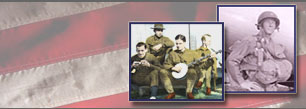

|
November 11, 2003 VETERANS HISTORY PROJECT ANNOUNCES NEW INITIATIVES ON 50th ANNIVERSARY OF VETERANS DAYLibrary of Congress’ American Folklife Center effort preserves America’s wartime history in the voices of those who lived it Washington, D.C. (November 11, 2003) – On the 50th Anniversary of Veterans Day, the Library of Congress Veterans History Project (VHP) announces a series of special initiatives to celebrate the Project and renew the nationwide call for all Americans to honor our veterans by joining the VHP in preserving our nation’s wartime stories. The origins of Veterans Day are in Armistice Day, declared in 1918 to mark the end, on November 11, of World War I. The first observance of Veterans Day took place in 1953 in Emporia, Kansas. The following year, President Dwight D. Eisenhower signed into law a bill that permanently changed the name of the holiday in order to honor all American veterans. On the 50th anniversary of the first observance of Veterans Day, the Veterans History Project announces several new initiatives:
In less than three years, the Library of Congress’ American Folklife Center, with support from the U.S. Congress and AARP, has collected over 10,000 wartime oral history submissions through the Veterans History Project. “We are proud to have collected so many stories in three years. But with more than 1,700 of America’s war veterans dying each day, our window of opportunity to preserve their stories for future generations is closing quickly,” said Librarian of Congress James H. Billington. “Every veteran has his or her own war, and each is custodian of a unique story and memories. This project will tell the American story through thousands of different voices, thousands of different pictures and thousands of different memories.” Of the VHP’s 10,000 submissions, no two are alike. Some veterans share their stories with friends and family through carefully crafted memoirs; others give interviews to nieces and nephews, grandchildren, and students, who have no personal remembrances of those times and events. Still others dust off their attic trunks and revisit their own war years (or those of deceased family members) through personal correspondence and photographs. AARP, the nation’s leading organization for people 50 and over, is the project’s founding private-sector sponsor. Together with 800 VHP partner organizations that are participating in the project, AARP is working with its members and vast national network of over 150,000 volunteers to collect stories from everyday Americans whose heroic deeds and wartime efforts preserved freedom. “We are actively encouraging our 35 million members to tell their own story and reach out to veterans whose stories have yet to be archived,” said AARP President Jim Parkel. Authorized by legislation passed in 2000, the Veterans History Project, a program of the Library of Congress American Folklife Center, collects first-person narratives from veterans and civilians who served America during wartime. The Project preserves written and oral histories, along with other documentary materials, from veterans of World War I, World War II and the Korean, Vietnam and Persian Gulf Wars, as well as stories from civilians who served on the home front. The Library of Congress is the world’s largest library and the national library of the United States. The Library was founded in 1800, making it the oldest federal cultural institution in the nation. The mission of the Library of Congress is to make its vast holdings available and useful to Congress and the American people and to sustain and preserve a universal collection of knowledge and human creativity for future generations. The Library started the Veterans History Project in 2000 in response to Public Law 106-380, sponsored in Congress by Rep. Ron Kind, Rep. Amo Houghton, Rep. Steny Hoyer, Sen. Max Cleland and Sen. Chuck Hagel. The American Folklife Center at the Library of Congress was created in 1976 to document, preserve and present all aspects of traditional culture and life in America. With more than two million items, it maintains the largest repository of traditional cultural documentation in the United States. The National Veterans History Collection preserved at the American Folklife Center will richly complement the Library’s existing holdings on this subject of enduring importance. AARP is a nonprofit, nonpartisan membership organization dedicated to making life better for people 50 and over. It provides information and resources; engages in legislative, regulatory and legal advocacy; assists members in serving their communities; and offers a wide range of unique benefits, special products, and services for its members. These include AARP The Magazine, published bimonthly; AARP Bulletin, its monthly newspaper; AARP Segunda Juventud, its quarterly newspaper in Spanish; NRTA Live and Learn, its quarterly newsletter for 50+ educators; and its Web site, www.aarp.org. AARP has staffed offices in all 50 states, the District of Columbia, Puerto Rico, and the U.S. Virgin Islands. For more information about the Veterans History Project, visit the Web site at http://www.loc.gov/vets/ # # # |
| The Library of
Congress >> American
Folklife Center June 23, 2005 |
For Researchers | Disclaimer | Contact Us |